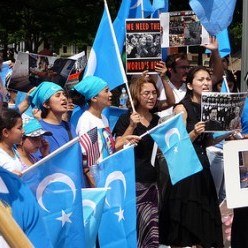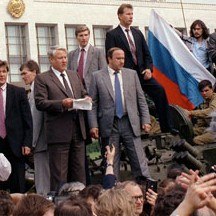(Video) "The Politics of Memory in a Divided Society: A Comparison of Post-Franco Spain and Post-Soviet Ukraine," a lecture by Oxana Shevel (Оксана Шевель), available on YouTube. Audio courtesy of Center for Russia, East Europe & Central Asia (CREECA), University of Wisconsin-Madison.
Contents:
– Historical memory, President Viktor Yushchenko sought reconciliation of Ukrainian veterans who fought on different sides during World War Two. Spain in World War II, General Franco 0:35
– Ukraine's official response has been completely different from what the Spanish state has done 1:37
– Kyiv Mohyla Academy, Ukrainian historian Natalia Yakovenko 2:07
– Both countries after authoritarian rule faced the same problem: how to (re)classify heros and villians 2:50
– Ukrainian nationalists, Ukrainian Insurgent Army 3:50
– Crimes against Jews, Poles 4:30
– How did Spain approach their challenge? Collective memory in Franco period. Franco rebellion, Spanish socialists 5:30
– Historical memory law. Emphasis on the rights of the victims. Multiplicity of memories, role of government, democratic memory 8:50
– Mass graves of General Franco in Spain, restitution of citizenship 10:30
– Political dimension of the law, democratic dimension of the law; Spanish Second Republic 12:00
– Value in postponing reconciliation after democratic and economic reforms have succeeded 14:40
– Case of Ukraine, Gorbachev period, Rukh movement raised the issue of reconciliation in the 1990s, Ukrainian Insurgent Army (UPA), Organization of Ukrainian Nationalists (OUN) 17:40
– Two pieces of legislation were adopted in Ukraine, first in April 1991, law on veterans in 1993. Soviet criminal code from the 1950s 18:45
– NKVD troops, etc. automatically eligible 20:30
– Ukrainian Rada, debate is very polarized 21:15
– Stepan Bandera 21:55
– Democratic memory in Ukraine, recognition of multiplicity of memories that resonate with Ukrainian population 23:20
– If you asked the majority of Ukrainian citizens "Is Stepan Bandera a hero?" They would answer clearly "no". If asked "Do you support reconciliation?" The answer would be "yes" 24:00
– Presidents Kravchuk, Kuchma, Yushchenko, and Yanokovych 25:00
– Stalemate of two overly idealized narratives of the past 29:00
– Soviet memory 29:55
– Spanish solution for Ukraine; teaching of history in Ukraine 30:47
– Review of Ukrainian textbooks in Ukraine. No textbooks resonate with students 32:00
– Approaches of history teaching not as characterizing certains groups as "good" or "bad", but in explaining the motives and mechanisms of behaviour in different segments of society "multiplicity of society" 33:50
– The rise of the victims, honoring the victims 35:15











